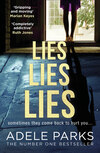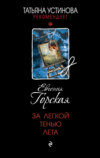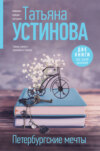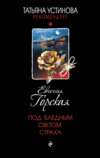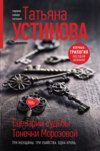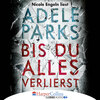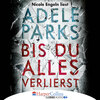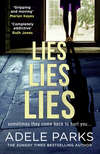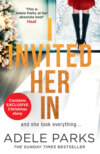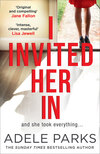Buch lesen: «Lies Lies Lies»
ADELE PARKS was born in Teesside, North-East England. Her first novel, Playing Away, was published in 2000 and since then she’s had eighteen international bestsellers, translated into twenty six languages. She’s an Ambassador for The National Literary Trust and The Reading Agency and a judge for the Costa. She’s lived in Italy, Botswana and London, and is now settled in Guildford, Surrey, with her husband, son and cat.
Also by Adele Parks
Playing Away
Game Over
Larger Than Life
The Other Woman’s Shoes
Still Thinking Of You
Husbands
Young Wives’ Tales
Happy Families (Quick Read)
Tell Me Something
Love Lies
Men I’ve Loved Before
About Last Night
Whatever It Takes
The State We’re In
Spare Brides
If You Go Away
The Stranger In My Home
The Image Of You
I Invited Her In
Short story collections
Love Is A Journey
Lies Lies Lies
Adele Parks

ONE PLACE MANY STORIES
Copyright

An imprint of HarperCollinsPublishers Ltd.
1 London Bridge Street
London SE1 9GF
First published in Great Britain by HQ in 2019
Copyright © Adele Parks 2019
Adele Parks asserts the moral right to be identified as the author of this work.
A catalogue record for this book is available from the British Library.
This novel is entirely a work of fiction. The names, characters and incidents portrayed in it are the work of the author’s imagination. Any resemblance to actual persons, living or dead, events or localities is entirely coincidental.
All rights reserved under International and Pan-American Copyright Conventions. By payment of the required fees, you have been granted the non-exclusive, non-transferable right to access and read the text of this e-book on-screen. No part of this text may be reproduced, transmitted, downloaded, decompiled, reverse engineered, or stored in or introduced into any information storage and retrieval system, in any form or by any means, whether electronic or mechanical, now known or hereinafter invented, without the express written permission of HarperCollins.
E-book Edition © September 2019 ISBN: 9780008284671
Note to Readers
This ebook contains the following accessibility features which, if supported by your device, can be accessed via your ereader/accessibility settings:
Change of font size and line height
Change of background and font colours
Change of font
Change justification
Text to speech
Page numbers taken from the following print edition: ISBN 9780008318413
For my dear friends Marguerite Weatherseed and Louise Gibbons. Two of the kindest people I have the privilege of knowing.
You are both simply lovely.
Praise for Adele Parks’ Lies Lies Lies
‘Gripping, moving and elegantly written’ Marian Keyes
‘Brilliant, moving and deeply satisfying, Parks is the queen of the domestic dark side’ Veronica Henry
‘Completely addictive… superbly drawn. Fabulous’ Ruth Jones
‘Compelling and suspenseful’ Catherine Isaac
‘I devoured Lies, Lies, Lies… so engaging, well written. It is one of those rare books that earns the title, unputdownable’ Sally Hepworth
‘Brilliantly twisty and makes for a thrilling, unputdownable read but is also so insightful about human nature: her characters, with all their flaws and secrets, are utterly real. A triumph’ Lucy Foley
‘BOOM! What a book! Layers and layers of intrigue and characters I want to spend a lifetime with. Loved it’ Suzy K Quinn
‘Utterly brilliant, twisting and twisting again, but also shocking and sad and triumphant and beautiful’ Rachel Edwards
‘Engrossing and emotional, Lies Lies Lies had me gripped from the very first page to the final shocking finale. Adele Parks just gets better and better’ Lisa Hall
Praise for Adele Parks’ I Invited Her In
‘Really, REALLY good… absolutely brilliant’ Marian Keyes
‘Packed with secrets, scandal and suspense, this is Adele Parks at her absolute best’ Heat
‘Wow! What a read. Intense, clever and masterful’ Lisa Jewell
‘Original and compelling. I read it in one sitting’ Jane Fallon
‘Fabulously gripping. Superb’ Ruth Jones
‘A beautifully written tale of revenge and retribution, full of unexpected plot twists’ The Daily Mail
‘Weaving together the emotions and ties that bind female friends with a cracking paced twist of a tale’ Stylist
‘This chilling domestic noir tale is full of revenge, betrayal and gasp-out-loud moments’ Fabulous Magazine
‘A tale of revenge and retribution that I read in a single, mesmerised sitting’ Woman & Home
‘A gripping read from the brilliant Adele Parks’ HELLO
Contents
Cover
About the Author
Booklist
Title Page
Copyright
Note to Readers
Dedication
Praise
Prologue
2016
1. Daisy
2. Simon
3. Daisy
4. Simon
5. Daisy
6. Simon
7. Daisy
8. Simon
9. Daisy
10. Simon
11. Daisy
12. Simon
13. Daisy
14. Simon
15. Daisy
16. Simon
17. Daisy
18. Simon
19. Daisy
20. Simon
21. Daisy
22. Simon
23. Daisy
24. Simon
2019
25. Daisy
26. Simon
27. Daisy
28. Simon
29. Daisy
30. Simon
31. Daisy
32. Simon
33. Daisy
34. Daisy
35. Simon
36. Daisy
37. Simon
38. Daisy
39. Simon
40. Daisy
41. Simon
42. Daisy
43. Daisy
44. Simon
45. Daisy
46. Simon
47. Daisy
48. Simon
49. Daisy
50. Simon
51. Daisy
52. Simon
53. Simon
54. Daisy
55. Simon
56. Daisy
57. Simon
58. Daisy
59. Simon
Epilogue
Extract from Just My Luck
Acknowledgements
Questions for Discussion
About the Publisher
Prologue
May 1976
Simon was six years old when he first tasted beer.
He was bathed and ready for bed wearing soft pyjamas, even though it was light outside; still early. Other kids were in the street, playing on their bikes, kicking a football. He could hear them through the open window, although he couldn’t see them because the blinds were closed. His daddy didn’t like the evening light glaring on the TV screen, his mummy didn’t like the neighbours looking in; keeping the room dark was something they agreed on.
His mummy didn’t like a lot of things: wasted food, messy bedrooms, Daddy driving too fast, his sister throwing a tantrum in public. Mummy liked ‘having standards’. He didn’t know what that meant, exactly. There was a standard-bearer at Cubs; he was a big boy and got to wave the flag at the front of the parade, but his mummy didn’t have a flag, so it was unclear. What was clear was that she didn’t like him to be in the street after six o’clock. She thought it was common. He wasn’t sure what common was either, something to do with having fun. She bathed him straight after tea and made him put on pyjamas, so that he couldn’t sneak outside.
He didn’t know what his daddy didn’t like, just what he did like. His daddy was always thirsty and liked a drink. When he was thirsty he was grumpy and when he had a drink, he laughed a lot. His daddy was an accountant and liked to count in lots of different ways: ‘a swift one’, ‘a cold one’, and ‘one more for the road’. Sometimes Simon thought his daddy was lying when he said he was an accountant; most likely, he was a pirate or a wizard. He said to people, ‘Pick your poison’, which sounded like something pirates might say, and he liked to drink, ‘the hair of a dog’ in the morning at the weekends, which was definitely a spell. Simon asked his mummy about it once and she told him to stop being silly and never to say those silly things outside the house.
He had been playing with his Etch A Sketch, which was only two months old and was a birthday present. Having seen it advertised on TV, Simon had begged for it, but it was disappointing. Just two silly knobs making lines that went up and down, side to side. Limited. Boring. He was bored. The furniture in the room was organised so all of it was pointing at the TV which was blaring but not interesting. The news. His parents liked watching the news, but he didn’t. His father was nursing a can of the grown ups’ pop that Simon was never allowed. The pop that smelt like nothing else, fruity and dark and tempting.
‘Can I have a sip?’ he asked.
‘Don’t be silly, Simon,’ his mother interjected. ‘You’re far too young. Beer is for daddies.’ He thought she said ‘daddies’, but she might have said ‘baddies’.
His father put the can to his lips, glared at his mother, cold. A look that said, ‘Shut up woman, this is man’s business.’ His mother had blushed, looked away as though she couldn’t stand to watch, but she held her tongue. Perhaps she thought the bitterness wouldn’t be to his taste, that one sip would put him off. He didn’t like the taste. But he enjoyed the collusion. He didn’t know that word then, but he instinctively understood the thrill. He and his daddy drinking grown ups’ pop! His father had looked satisfied when he swallowed back the first mouthful, then pushed for a second. He looked almost proud. Simon tasted the aluminium can, the snappy biting bitter bubbles and it lit a fuse.
After that, in the mornings, Simon would sometimes get up early, before Mummy or Daddy or his little sister, and he’d dash around the house before school, tidying up. He’d open the curtains, empty the ashtrays, clear away the discarded cans. Invariably his mother went to bed before his father. Perhaps she didn’t want to have to watch him drink himself into a stupor every night, perhaps she hoped denying him an audience might take away some of the fun for him, some of the need. She never saw just how bad the place looked by the time his father staggered upstairs to bed. Simon knew it was important that she didn’t see that particular brand of chaos.
Occasionally there would be a small amount of beer left in one of the cans. Simon would slurp it back. He found he liked the flat, forbidden, taste just as much as the fizzy hit of fresh beer. He’d throw open a window, so the cigarette smoke and the secrets could drift away. When his mother came downstairs, she would smile at him and thank him for tidying up.
‘You’re a good boy, Simon,’ she’d say with some relief. And no idea.
When there weren’t dregs to be slugged, he sometimes opened a new can. Threw half of it down his throat before eating his breakfast. His father never kept count.
Some people say their favourite smell is freshly baked bread, others say coffee or a campfire. From a very young age, few scents could pop Simon’s nerve endings like the scent of beer.
The promise of it.
2016
1
Chapter 1, Daisy
Thursday, 9th June 2016
I don’t think it is a good idea to bring Millie here to the clinic. I’ve said as much to Simon on about half a dozen occasions. Besides the fact that she’s missing her after-school ballet class and she’ll be bored out of her mind, it isn’t the sort of place children should be. There’s the issue of being sensitive to the other patients for a start. It’s too easy to imagine that people who are trying for a child adore every kid they encounter; it’s not always the case, sometimes they outright dislike them, even adorable ones like Millie. It’s too painful. Millie’s tinkling chatter in the waiting room might inadvertently irritate, cause upset. It sounds extreme, but infertility is a raw and painful matter. Plus, I’m worried about what to do with her when we go into the consultancy room for a chat with the doctor. This is only a chat. That’s all I’ve agreed to. Yet, I can’t very well have her sit through a conversation about sperm and ovulation, the possibility (because it’s not a probability) of her having a sibling. But nor am I comfortable with the idea of leaving her with the receptionist; she’s just six.
We hadn’t initially planned to bring her with us but at the last moment our childminding arrangements fell through, as child-minding arrangements are wont to do. We had little choice. I wanted to postpone the meeting. For ever, actually, but Simon was eager to get talking about the options and said postponing was out of the question. She would come with.
‘The sooner we know what’s wrong, the sooner we can get it fixed,’ he said optimistically, his face alive with a big, hopeful grin.
‘There’s nothing wrong, we’re just old,’ I pointed out.
‘Older. Not old. Not too old. Lots of women give birth at forty-five years of age,’ he insisted. ‘Some of those are first-time mothers. The fact that we’ve already had Millie means you’re in a better position than those women.’
I think the fact that we already have Millie means we should leave the matter alone. Be content with one child. I think contentment is an extremely underrated life goal. Simon holds no truck with contentment. He likes to be deliriously happy or miserable. He’d never admit as much but we’ve been together seventeen years and I know him better than he knows himself. It seems to me that we have spent far too much of our married life in clinics such as this one. Places with beige walls and tempered expectations, places that take your cash and hope but can’t guarantee anything in return. When we had Millie – our miracle! – I thought all this aggravation, frustration and discontent was behind us for good. One is enough for me. I had thought, hoped, it would be enough for Simon.
Millie is perfect.
We shouldn’t push our luck. I’ve always been a ‘count your blessings’ sort of person. I don’t want an embarrassment of riches, I prefer to scrape under the radar with a sufficiency. Simon and I do not think alike on this. Obviously, he agrees Millie is perfect. For him, it’s her very perfection that’s driving his want to make more babies.
For the last couple of years, more or less since Millie started pre-school, Simon has been saying we ought to try again. I’ve nodded, smiled, acknowledged his suggestion without entering into any sort of real discussion. I mean, in a way we are trying, at least we’re not avoiding the possibility – we don’t use contraception. However, at our age, with our history, that’s not trying hard enough. We’d have to get some help if we want a second child. I know that. Recently, Simon has significantly upped the ante in terms of his persistence with this idea. He can’t seem to just enjoy what we have.
Half term is a good example. We took a cottage in Devon because British families have been doing so for generations and, evidently, we lack the necessary imagination to buck the trend. This year we took a chance, selecting a new part of Devon that we hadn’t previously visited. The cottage was dated but well-scrubbed, and whilst the water pressure made showering a slow and disappointing process, there was an open fire, an Aga and a shelf of jigsaws and board games, so we thought the place was perfect. The garden fell away to a footpath that led directly to the beach. I’m always surprised by beaches. They’re never as restful or ideal for contemplation as I imagine. British beaches are noisy places: waves crash, seagulls squawk, the wind scrapes the sand, and children laugh, cry and shriek. It’s best to accept this, embrace it. We’re keen to offer Millie every opportunity that might be presented in an Enid Blyton novel so despite the sometimes iffy weather, we took long walks and endured breezy picnics without admitting to the chill. We went crabbing and scoured rock pools for mini creatures that delighted Millie. We were just a short drive away from a petting farm and a small village packed with pastel-coloured buildings, where every second shop sold fish and chips. Yes, perfect.
It was hardly a retreat though. The place was too picturesque to remain a secret. Indeed, we’d discovered it because it was featured in a glossy Sunday newspaper supplement. Yet despite the identikit families dressed in Boden, trailing plastic buckets and spades, we managed to carve out some privacy, some time to ourselves. We ignored the crowds and the queues, and we drew a magic circle around us. Naturally, Millie made friends with other children on the beach. She’s confident, open and pretty, just the sort of kid other kids like to befriend, but when the parents of her new acquaintances invited us to join them for a scone at the café or a barbecue in their rental, we declined. We made up excuses, told small lies about already having plans and commitments. I’m not at all like Millie, I’m not confident about making new friends, I never have been. I was never what anyone would have considered a pretty girl. It’s not the worst thing in the world, although some people seem to think it is. As a child, I concentrated on being kind and funny, well informed, with aspirations of being thought of as reasonably clever. It was enough. I got by. I have great friends now but I’m not a fan of making casual, transient relationships on holiday. Why bother? Besides, we were so blissful, just the three of us, we didn’t want or need anyone else. Three is the perfect number. Fun facts: the Pythagoreans thought that the number three was the first true number. Three is the first number that forms a geometrical figure, the triangle. Three is considered the number of harmony, wisdom and understanding. I’ve always thought that three is particularly significant as it’s the number that is most often associated with time: past, present, future; beginning, middle, end; birth, life, death.
I sigh, glancing around the fertility clinic reception, I really don’t think we need to be here, trying for another baby. It’s like we’re pushing our luck. Being greedy. Asking for trouble. We’re happy as we are.
Simon squeezes my hand. I think of the last night in the cottage. Millie was exhausted after a week of fresh air and long walks, she almost nodded off at the kitchen table over supper. We got her to bed by 7 p.m. and she was asleep the moment her head hit the pillow. Simon suggested we have a glass of wine in the back garden, make the most of our last night and the privacy that our cottage offered. There was a gas heater, one of those that’s bad for the environment so I demurred, but Simon persuaded me, ‘Just once. Go with it.’
Let’s just say, the wine (not a glass but two bottles in the end) and the sound of the sea crashing on the beach, the novelty of spending time alone together without other people or even Netflix, had an effect. We made love under the stars and a blanket. It was exciting, daring. The last time we did anything as risky was so long ago I can’t remember when it was exactly. Years and years ago. Afterwards, we lay snuggled up under the slightly scratchy picnic blanket, clinging to one another for warmth, and just allowed ourselves to be. Be relaxed. Be satisfied. Be enough. It was blissful. Until Simon kissed the top of my head and said, ‘Do you know the one and only thing that could make this moment more perfect?’
‘A post-coital cigarette?’ I joked. I’ve never been a smoker and Simon gave up when we first started dating. I know he still misses it, even after all this time he craves the nicotine hit. Simon likes hits and highs. I don’t get it at all. I’m not the sort of person who values kicks above health.
‘Well, that would be good, but no. I was thinking a baby, asleep in the other room.’
‘We have a baby asleep in the other room.’
‘We have a little girl,’ he said gently, not unkindly.
‘Well, they can’t stay babies for ever.’
‘That’s not my point.’
I felt the warmth of his body along the length of mine and yet I still shivered. ‘You’re serious?’
‘I love Millie so much. And you,’ he added swiftly. ‘I can’t bear to think that we’re not giving her everything.’
‘We do give her everything we can,’ I pointed out.
‘Other than a sibling,’ he countered.
‘Yeah but it’s not as though we tried to deny her that, it just hasn’t happened. It’s unlikely ever to because neither of us are getting any younger.’ And conceiving was never something we were good at. I don’t add that. We don’t talk about the horrors we went through to get Millie. It’s generally agreed that the pain of childbirth is forgotten once you hold the baby in your arms. In my case it was also the pain of years of trying to conceive.
‘We should make it happen. She’s so gregarious and loving. I can’t bear the idea of her missing out on having a sibling.’
‘Having a sibling isn’t always a bonus,’ I argued. ‘You’re not at all close to your sister.’
‘No, but you adore yours. I want Millie to have what you and Rose share.’ He turned to me and I saw fire in his eyes. I should have understood then that he wasn’t going to let the matter drop. He’s a very determined man when he wants to be.
Stubborn, my mum says.
